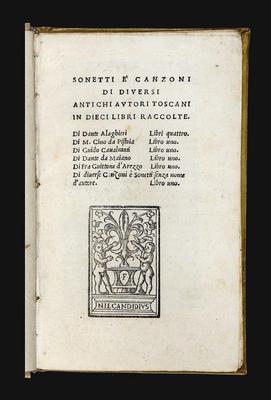Dante Alighieri
Sonetti e’ Canzoni di diversi antichi Autori Toscani in dieci libri raccolte. Di Dante Alaghieri Libri quattro. Di M. Cino da Pistoia Libro uno. Di Guido Cavalcanti Libro uno. Di Dante da Maiano Libro uno. Di Fra Guittone d’Arezzo Libro uno. Di diverse Canzoni e’ Sonetti senza nome d’autore Libro uno.
Florence, Filippo Giunta's heirs, 6 July 1527.8° (161x96 mm). Collation: AA4, a-s8, t4. [4], 148 leaves. Italic and roman type. Woodcut printer's device on the title-page and on the verso of the last leaf. Early twentieth-century vellum, over pasteboards. Spine with title and imprint in gilt on double lettering pieces. Marbled pastedowns and flyleaves. A very good copy, light marginal waterstains and foxing.
Provenance: the Italian violinist Arrigo Serato (1877-1948; ex-libris on the front pastedown); Livio Ambrogio collection.
The rare first edition of the remarkable collection known as the ‘Giuntina di rime antiche', the first anthology in print which contains Dante's canzoniere and the lyrics composed by the poets belonging to the tradition of the Dolce Stil Novo. Edited by Bardo di Antonio Segni, member of a distinguished Florentine family, the anthology is an authentic monument to Italian vernacular poetry. In his prefatory letter the printer Bernardo Giunta addressed the publication to the Amatori de le toscane rime, i.e. admirers of Tuscan poetry, inviting them to read and study the early vernacular lyric tradition, and Dante's poems above all.
The Giuntina di rime antiche is divided into eleven books (not ten as erroneously stated in the title), and includes the texts of about three hundred poems, most of which had never appeared in print. The compositions are grouped by metrical form, and are almost entirely by Tuscan authors, although the anthology also contains the poetical production of the Sicilian and Bolognese Schools (the former is represented by, among others, Giacomo da Lentini, Guido delle Colonne, and Pier delle Vigne, while for the latter there are poems composed by Guido Guinizelli, Onesto degli Onesti, and others).
The first four books of this edition are entirely devoted to Dante, and contain for the first time his complete poems, excluding the Commedia but including the poems from the Vita Nuova, which was only published in its complete form in 1576. The Giuntina poetical collection is very important from a textual point of view, and played a significant part in the reconstruction of the complex history of Dante's lyrical works. In addition to the fifteen so-called canzoni distese, the texts of which are mainly derived from Giovanni Boccaccio's transcriptions, the editor Bardo di Antonio Segni attributes to Dante poems which are not included in the manuscripts which have come down to us.
The edition represents the highest achievement in print of the long tradition of Florentine lyric anthologies.


